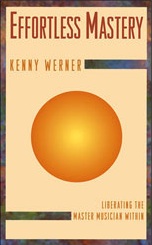Overview
The book begins by chronicling Werner's musical education. He was a dysfunctional learner from an early age, which he credits to the school system and the "cultural wasteland" which he grew up in. [a] While he never practiced unless forced to, he was still the best pianist in the neighborhood, the only way he had of being accepted by his peers. [b] When he was of college age, he applied to and was accepted to the Manhattan School of Music, where he discovered to his dismay, that there were students there who could play as well or better than he could, and who practiced.
He decided that classical piano was not for him, and switched to Berklee College of Music, because of its jazz program. He was relieved to find others like him, and finally began to practice in some way. [c] While there, he took lessons with a woman named Madame Chaloff, who focused on the physical action of playing the piano gracefully. [d]
After attending Berklee three years, he visited Rio de Janeiro, where he met Joăo Assis Brasil. Brasil had recently suffered a nervous breakdown from strenuous practicing, and taught Werner an exercise that his therapist had taught him. [e] After playing nothing but this exercise for a week, Werner performed, and discovered that he was playing better, despite having only practiced the exercise. From that point, he developed his philosophy and teaching methods which led to this book. [f]
From there, the book focuses on reasons why people play, why they stop playing, and why some are afraid of playing music. [g] He talks about dysfunctional and fear-based teaching, practicing, listening, and composing. [h] Then he begins talking about "The Space" and effortless playing. The four meditations on the CD are meant to be listened to in-between chapters in this section of the book. He describes effortless playing in four steps: Step one is being able to play a note on one's instrument while relaxed and calm, step two is to play a free improvisation while in said state, step three is discovering what things one can play while in this state, step four is to master playing music effortlessly, hence the book's name. [i]
This page is based on this
Wikipedia article Text is available under the
CC BY-SA 4.0 license; additional terms may apply.
Images, videos and audio are available under their respective licenses.
